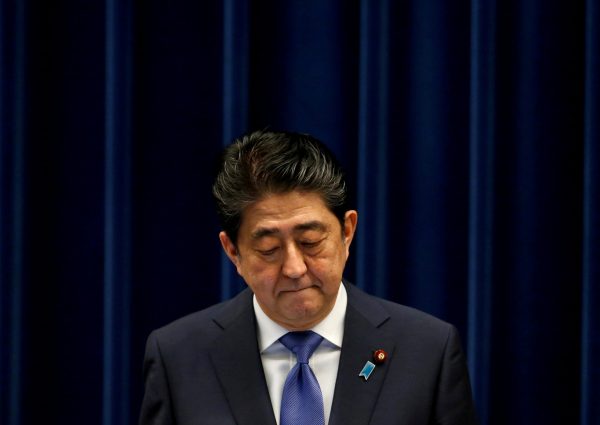Following Pyongyang’s official admission and return of five Japanese victims and their families in 2002 and 2004 respectively, and its claim that the remaining 12 abductees are no longer alive, North Korea considers the abduction issue to be resolved. Refusing to believe this claim, Japan insists on the return of the remaining abductees as a precondition for normalising diplomatic relations with and lifting economic sanctions on North Korea.
The unfolding detente on the Korean Peninsula is complicating Abe’s efforts to deal with the abduction issue. Abe must either follow the United States and radically revise Japan’s long-standing hard-line stance on North Korea, or continue to emphasise the resolution of the abduction issue as a precondition for progress in Japan–North Korea relations.
Trump’s announcement of support for Japan’s security concerns with North Korea prior to the Trump–Kim summit in Singapore appeared to suggest that Abe’s efforts to cultivate close ties with Trump would pay off. But Trump’s sudden and seemingly un-coordinated deviation from his ‘maximum pressure’ campaign has since raised major concerns in Japan, where the US–North Korea joint statement has been met with disappointment. The document makes no mention of the abduction issue, nor does it outline a clear roadmap to denuclearisation or the dismantlement of North Korea’s short- and mid-range missiles and non-nuclear weapons of mass destruction.
US–North Korea rapprochement has forced Japan to reassess its North Korea policy. Following Kim Jong-il’s formal admission of the abduction issue at the 2002 Japan–North Korea summit, domestic backlash in Japan forestalled progress on normalising the countries’ diplomatic relations. Spearheaded by Abe, Japan’s conservative elite has relied on the abduction issue to call for comprehensive reform of Japan’s post-war constitution. They argue that North Korea’s kidnappings are the result of a weak Japanese state that is unable to protect its citizens. Only a ‘departure from the post-war regime’ and restoration of a strong Japan through constitutional revision can secure the nation against a bellicose North Korea.
Building on this narrative, Japanese strategists are pushing to scrap Japan’s 1 per cent defence budget ceiling, develop pre-emptive strike capabilities and acquire new defence equipment to deal with Japan’s ‘more intense security environment’.
To mobilise and consolidate support for this agenda, Abe has further amplified the North Korea threat narrative. Since early 2017, Japanese authorities have repeatedly conducted public drills to prepare the population for North Korean missile strikes. In August, the J-Alert emergency warning system was used for the first time to alarm citizens of an incoming North Korean missile. This move was repeated in September — just two weeks prior to Abe’s call for a snap election. With Japan’s population on alert, Abe framed the 2017 elections a political measure to overcome ‘Japan’s national crisis’.
Detente on the Korean Peninsula would remove a central argument for Abe’s plans to restore a militarily strong Japan. And as Trump’s rapprochement with North Korea leaves Japan isolated, Abe’s focus on the abduction issue constrains his policy options in dealing with North Korea.
But Abe has demonstrated flexibility in the past. Amid the 2013 North Korean missile and nuclear crisis, Abe deviated from US-led ‘strategic patience’ by initiating talks with Pyongyang that resulted in the 2014 Stockholm Agreement. Although North Korea’s pledge to reopen its investigation into the abductions did not produce any concrete results, this episode illustrates that Japan was willing to push its own North Korean agenda. Abe should return to this pragmatism to secure his own space for diplomatic manoeuvres and ensure that Japan is not left merely paying for the bill of North Korean denuclearisation.
To be able to shape the course of peace and stability on the Korean Peninsula, Abe needs to redefine Japan’s base line in discussing the abduction issue and be prepared to accept a negative response from North Korea. As prominent Liberal Democratic Party (LDP) veterans have recently argued, Japan can first open normalisation talks with North Korea and address the abduction issue at a later stage.
In response to the powerful abduction movement, Abe dispatched Japanese diplomats to set-up communication with North Korea to assess the possibility of an Abe–Kim summit. This summit is likely to be held as early as September 2018 in Vladivostok. According to the latest polls, the majority of the Japanese public supports such a meeting but remains sceptical over it producing any resolution of the abduction issue.
The stakes are high for Abe. Resolving the North Korean missile and nuclear crisis will weaken Abe’s push for revising Japan’s post-war constitution. But in light of domestic political scandals, a successful summit would aid the recovery of Abe’s public support as he prepares for a third term as LDP president in September. On the other hand, should Abe fail to temper public expectations on Japan–North Korea talks, he will be faced with yet another source of drag on his support.
Sebastian Maslow is Research Fellow at the Institute of Social Science, the University of Tokyo. His research focusses on Japan–North Korea relations and East Asian security affairs.

